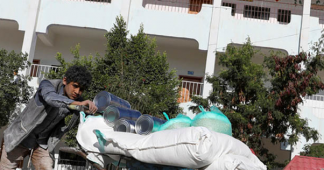Every day at 6pm Greeks turn on their TV sets and tune into a broadcast that at other times they might have missed. Like most rituals, there are no surprises: each time they encounter the same scene, two men, seated several metres apart, behind a long table in a brightly lit room.
The health ministry’s daily coronavirus briefing then begins with Sotiris Tsiodras, a soft-spoken Harvard-trained professor of infectious diseases, delivering the latest facts and figures with the occasional emotional plea. Nikos Hardalias, the civil defence minister, invariably follows, invoking the gravity of the situation with warnings that Greeks “must stay at home”.
The bookish professor and no-nonsense former mayor are the faces who have come to be associated with the government’s drive to contain the spread of Covid-19. Their efforts at keeping the country virus-safe appear to be paying off: in a population of just over 11 million, there were, as of Monday, 2,145 confirmed cases of coronavirus and 99 fatalities, far lower than elsewhere in Europe. Italy to date has registered 20,465 deaths.
Greece, it is generally agreed, is having a better crisis than may have been expected. Tsiodras recently allowed himself to speak of “a flattening of the curve” even if authorities accept that the prospect of Orthodox Easter, on 19 April, is unlikely to be without challenge. Traditionally, Greeks flock to ancestral villages in the countryside to celebrate the biggest festival in their religious calendar.
Read more at https://www.theguardian.com/world/2020/apr/14/how-greece-is-beating-coronavirus-despite-a-decade-of-debt#maincontent











